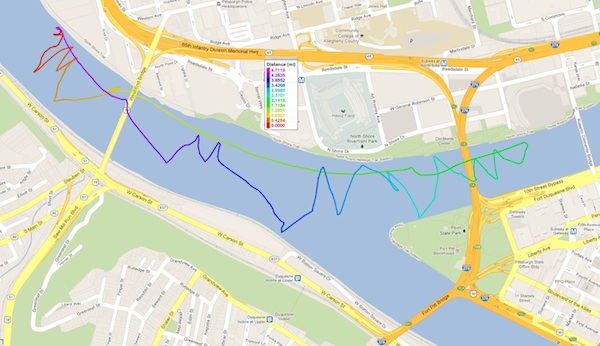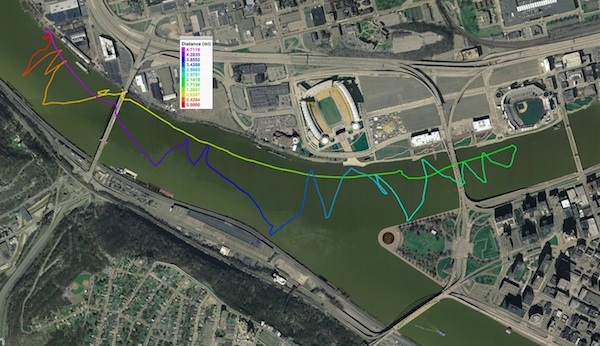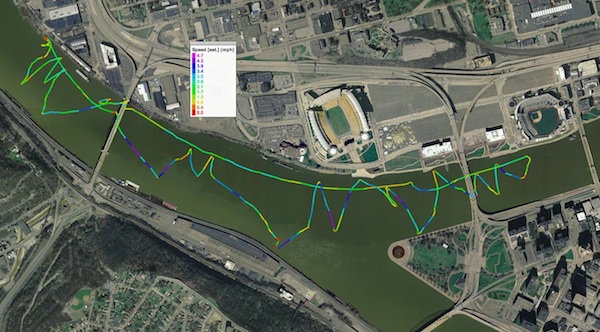Three Professors in a Boat
August 17, 2012
On Wednesday, I was having dinner with my colleague from the physics department, Tony Duncan. The occasion was the visit of his co-author on many projects, the noted historian of science from Minnesota, Michel Janssen (who also happens to be a Pitt graduate).
Tony has a rather wonderful model of Nelson's flagship, Victory, which I admire very much. "That is Cook's," he said, pointing to another model. This antipodean could carry the ball. "Oh, it's the Endeavour." Tony has a passion for the history of sailing. I'd found a kindred spirit. Michel watched in distant amusement as we began exchanging sailing yarns like ten year olds comparing bottletops. Tony has a lovely library of sailing books. I could not leave, he insisted, without taking two of them. And, yes, he would like to sail on the river.
So I began watching the winds and current, not expecting anything suitable to come for a while. Then there it was. Friday. Today. The forecast called for Northwest winds of around 8-9 mph in the afternoon, after some rain. Here's the National Weather Service forecast from around noon.
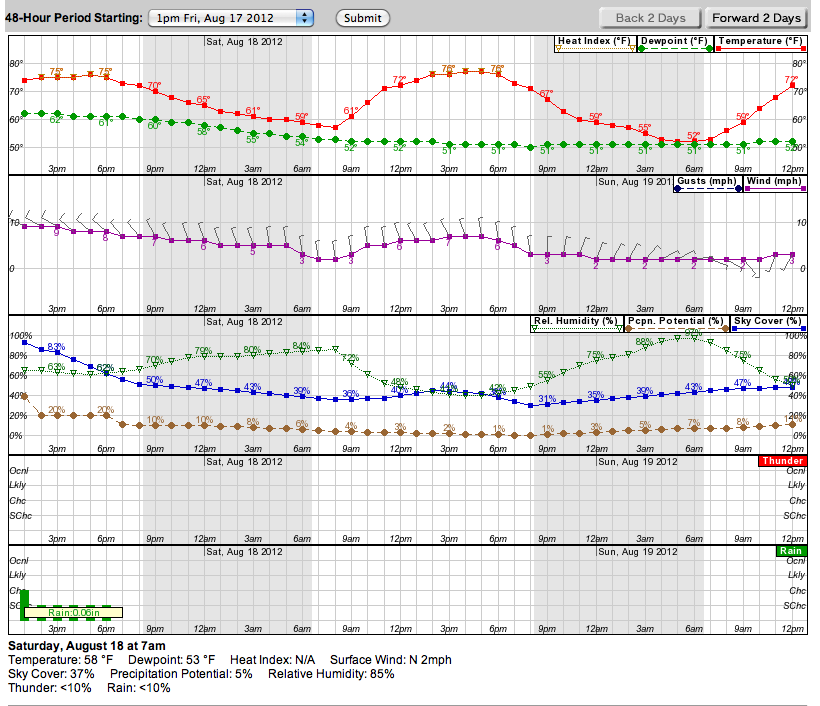
These are the great conditions. The wind will blow straight down the Ohio and Mon Rivers. I was paying less attention to the windfinder forecast, which by morning called for lesser winds and for some periods of Southwesterly winds. Those winds are not good. They are shielded by the ridges on the Southern shore of the Ohio and Mon. (That, I was to discover, was a mistake. Windfinder may get its data from the National Weather Service. But windfinder's forecasts seem to be updated more frequently and thus are more reliable in the shorter term.)
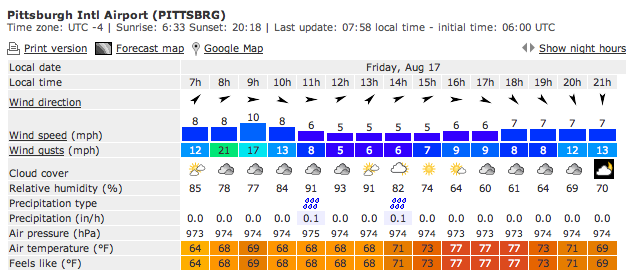
In any case, the currents on the Ohio, Allegheny and Mon were low--all below 10,000 cubic feet per second. The temperatures were good, in the mid 70's F. This seemed like as good a time as any. Better, I would have the great pleasure of two professors in the boat with me. That would not happen if we delayed. Michel would shortly be returning to Minnesota.
We met at the dock of the Newport marina at 2:30pm. The rain predicted had come and it had stayed. I'd delaying taking to the trails on my bicycle until the rains eased. The plan had been to have the boat rigged when they arrived. When they pulled up, I had not even started. They set to the task of helping me rig the boat.
What happens when three professors engage in recreation? Now that I step back and set out to describe it, I have to say, it's different.
Michel and Tony set off from the storage locker with the sail between them. One sailor would just heave the thing over a shoulder and go. Two professors who collaborate divide the labor evenly and fairly. It's different.
They come to a point on the dock where they can go left or right. Michel is in the lead. He halts. "Which way?" I'm thinking. "Buridan's Ass?" Tony is ahead of me. He calls out: "Either, they commute."
Let me explain. Tony could have said, it doesn't matter whether you go left first and then right, or right first and then left. You will end up in the same place. But that would use many words when few will do. Michel and Tony work in quantum mechanics. The theory builds chains of mathematical things ("operators"). A lot of time is spent wondering whether laying down this one first and then adding that one would be the same as reversing the order. That is so only when they have the special property that... you guessed it... they commute.
Professors love precision and the few words that capture the big ideas.
Michel and Tony have only a little sailboat experience, so it was slow getting everything set up and ready to go. As I approached them on the dock, I could see that they were engaged in some detailed collaborative effort.
They do know what to do with lifejackets.
Here they are listening as I explain that they didn't need to be trussed up quite that tightly. "You are very unlikely to end up in the water, and, if you do, there's not really too much to worry about in a ...." While I spoke, they beamed at me uncomprehendingly.
Soon we were out on the water.
There was rather little wind so we looked around and at each other and chatted. "Keep an eye on the horizon," I said, "look out for barges." On cue, just a few moments later, there was one.
We were right in the channel navigated by barges. I immediately turned the boat and, with some urgency, set us on a course to the other side of the river. It took a little while before they realized that my urgency was not pantomime. These barges are big, fast and heavy. They cannot stop for an inattentive sailor. Since there was little wind, Michel took up the paddle. The barge was soon upon us and much sooner than you expect if you've not had the experience.
"It does move quickly," Tony said.
"Yes, it's why I think there are no other sailors on the rivers." I said.
"Oh, I see, it's Darwinian." The quip was, I think, Michel's.
"Well, not quite, but it is what they are afraid of."
Perhaps this terse professorial exchange needs translation. In Darwin's theory, there are many gazelles. Some are short and fat and slow on their feet. Others are lithe and graceful and very fast. Now come the hungry lions. The herd is culled and, soon enough, only the fast remain. With those few words, we had shared an image. It is of a river full of sailboats. Some are sailed by dull-witted and inattentive sailors. Others are cautious and respond with urgency. All these sailboats mill about aimlessly until the barges come. The outcome is assured with mathematical precision. That is why these two passengers can see only fast gazelles in the zoo and can be piloted on the river by a cautious sailor.
----------------------
So went our chatter for the afternoon.
These professor truly are an odd bunch. But now I must confess something to you. There are three professors in this boat, not two. Until I set about describing the events of the afternoon, I did not see anything at all in the afternoon that was even the slightest bit strange.
I have developed a new appreciation for my ever kind and tolerant family.
----------------------
When we had planned the day, I had grand images of us skipping rapidly over the waters under the steady press of the Northwest winds promised. Alas, it was not to be. We put into the water at about 3pm. We slowly sputtered up the river towards the Point, taking little puffs of wind as they came. Otherwise, we sat out the calm moments, professing. The best speed we made was around 5 mph, well short of our maximum, and we made that only once or twice.
Here are the gps tracks, color coded for distance and speed. They tell the story:
The most revealing is the last track, coded for speed. It is unusually dappled. There's a little of this speed; and then that; and then that. This was not smooth sailing. This was sailing in fits and starts.
I don't mind that sort of sailing. For me, it is the challenge of solving the endless puzzle of the wind. You need to chase the winds, hunt it out on the river, to turn and weave with it, to make the very best of the very little you have. But I feared my passengers might not be finding this entertaining. Fortunately they insisted they were having fun and refused my offers to let them off at the nearest shore.
What went wrong? The record of wind reveals it. We did have some wind, in the 4-5 mph range. But it had dipped to the Southwest in the afternoon. That meant that all we had on the river was what was able to get past the ridge on the Southern bank. I should have taken more notice of windfinder. It had predicted Southwesterly winds.
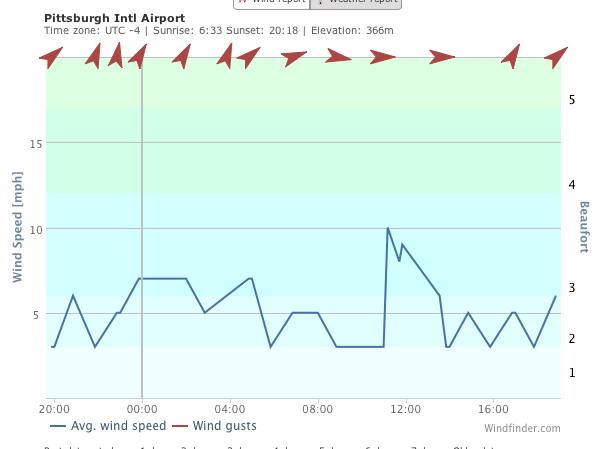
Here's the National Weather service record.
We made it far enough up the river to make the trip worthwhile. We passed the submarine at the Science Center.
Here we are at the Point. It took over an hour to get here--4:10pm.
I liked the way the water glistened when the sun finally came out.
We made it up about as far at the baseball field before turning back:
Returning home, the Point is now left behind in our wake:
Home! It's 6pm.
The final ritual is the carrying of the sail. It is now perfected. They have found the more stable configuration in which they stand on the same side.
John D. Norton
Back to main
